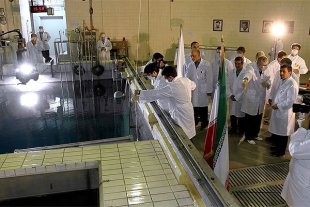The latest report for the International Atomic Energy Agency (IAEA) indicates that the Iranians are either way ahead of plans or are bluffing their way much the same as Saddam did ten years ago. Is it a bluff? If so, it is a dangerous one.
The IAEA report makes it very clear they are concerned, especially in light of military uses of the nuclear program. We quote:
"51. The Agency continues to have serious concerns regarding possible military dimensions to Iran’s nuclear
programme, as explained in GOV/2011/65. Iran did not provide access to Parchin, as requested by the
Agency during its two recent visits to Tehran, and no agreement was reached with Iran on a structured
approach to resolving all outstanding issues in connection with Iran’s nuclear programme."
This report cannot calm the feelings in Tel Aviv. If anything, it has to make the situation even worse. Washington should also be concerned.
Scary, at best. Deadly at worst.
Conservative Tom
New IAEA report shows Iran expands nuclear enrichment at Natanz
By Laura Rozen | The Envoy – 1 hr 26 mins ago Iran President Mahmoud Ahmadinejad touring Tehran's research reactor Feb. 15, 2012. (AFP/Getty)A new UN atomic watchdog agency report raises concerns about Iran's expansion of enrichment activities, as well as its continued foot-dragging in refusing to answer questions about suspected military dimensions of its nuclear program. But the new assessment also hinted at possible technical problems Iran is experiencing, nuclear experts said.
Iran President Mahmoud Ahmadinejad touring Tehran's research reactor Feb. 15, 2012. (AFP/Getty)A new UN atomic watchdog agency report raises concerns about Iran's expansion of enrichment activities, as well as its continued foot-dragging in refusing to answer questions about suspected military dimensions of its nuclear program. But the new assessment also hinted at possible technical problems Iran is experiencing, nuclear experts said.The 11-page report (.pdf), issued by the Vienna-based International Atomic Energy Agency (IAEA) Friday, comes as the international community is considering how to respond to Iran's expressed readiness to resume negotiations on its nuclear program. It also comes on the heels of the IAEA's expression of frank disappointment over being denied a visit to the Parchin military base at the conclusion of their two-day trip to Iran this week. Agency inspectors want to determine if a building on the site was used to carry out tests of an explosive device.
The agency's latest report shows that Iran has rapidly expanded the number of centrifuges installed at its main Natanz uranium enrichment facility, reaching 9,000 today compared to 6,000 last fall. (It's not clear that all of the installed machines are operating, the agency said.) Still, the assessment offers hints that Iran is having trouble with its more advanced centrifuges. Nuclear experts speculated that because of international sanctions Iran may be having trouble procuring the steel needed for the more advanced centrifuge models.
In the meantime, nuclear experts are puzzled by aspects of Iran's behavior at a more sensitive nuclear enrichment site: the Fordow facility built deep in a mountain near Qom, which is considered less vulnerable to possible military strikes.
Among the concerns for nuclear watchdogs, Iran keeps changing its declared work plan for the facility, which Iran did not disclose until the international community detected it in 2009.
"The sheer fact they keep changing it raises questions about why it was originally built," Paul Brannan, an Iran nuclear expert with the Institute for Science and International Security, told Yahoo News in an interview Friday.
While Iran has placed the outer casings of 2,000 older-generation centrifuges at the Fordow site, according to the new IAEA report, it has not installed the actual machines. Brannan said he found that behavior "strange."
"By only installing the outer casings and not the whole machines, they may be sending a warning about what they intend to do," he said. "Either way, it's not clear whether or not they actually have the capability to install the entire machines in those numbers."
"Is it a bluff?" he continued. The Iranians "know how significant Fordow is. If they put in the two thousand machine casings, but not the actual machines, it is sending a signal."
Israel considers Iran's enrichment activities at Fordow a particular cause of alarm, because it believes the facility is less vulnerable to Israeli air strikes given its placement in a fortified bunker in a mountain.
Iran should well know that Israel is a strong ally of the United States, and as in the case of Iraq, we'll ask to see any facilities. If we aren't let in, we are sure to consider that certain that something is being hidden, and nonetheless will call the bluff. One thing is even more certain, and that is that Israel is trigger happy right now—and I don't mean that in a necessarily negative way. They've put up with a lot of bad stuff over the years, and Iran now threatens their anhilation. That would put anyone on high, high alert, and just as if someone was outside my door screaming they had a gun and were going to shoot me down, even if I couldn't see the gun, I'd be quick to draw my own weapon and shoot through the door. That's sort of what's happening here. And while the Obama administration is not very supportive of Israel, I think if a conflict ensued, and Israel ran into some trouble, we'd give them a hand. That should put IRAN on alert.
ReplyDelete